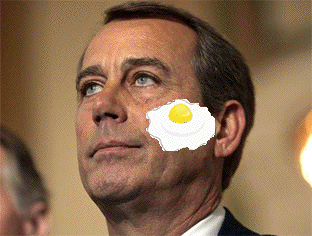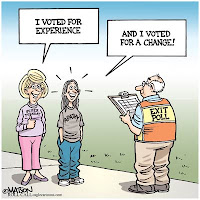The whole US economy might be operating according to Soros' observation of multi-peak bubbles. If this is the case, one question is, "What peak did we recently observe collapse? Was it the first peak or the second?"
One view is that the end of the first peak was signified by the 2000-2001 stock market crash and that we are now witnessing the end of the second peak. This is shown in the graph of the Dow Jones stock index below. Keep in mind the Dow Jones is not the economy, nor even a good reflection of the economy. But, it is a pretty convincing picture, no?
Despite the convincing picture above, another perspective holds that this is not the "big one." This perspective crossed my mind when I read the following about Obama inviting former Federal Reserve Chairman Paul Volcker to head his newly created Economic Recovery Advisory Board:
Volcker is no stranger to economic crises, having led the Fed under two presidents from 1979 to 1987. Volcker is a legendary central banker who raised interest rates and restricted the money supply to tame raging inflation in the 1980s. It was a painful prescription that helped send the economy into one of the nation's worst recessions.
I thought, as many have, that the debt-based US economy is still a house of cards, a fact being hidden by government bailouts. The Federal Reserve has stealthly pumped over four-times as much money into failing Wall Street institutions than the US Treasury Department's $700 billion bailout package is poised to do (This doesn't count the US tax payer "guaranteeing" of potential future losses, which brings the total tax payer obligation to over $7.7 trillion).
To put it in perspective...
The money that’s been pledged is equivalent to $24,000 for every man, woman and child in the country. It’s nine times what the U.S. has spent so far on wars in Iraq and Afghanistan, according to Congressional Budget Office figures. It could pay off more than half the country’s mortgages.
Some of the new money being created by the Federal Reserve appears to be disconnected from the issuing of Treasury notes. If true, this is a money printing process that could be highly inflationary.
Under the alternative line of reasoning that says "we are not currently experiencing the big one," the collapse of the dollar signifies the remaining "bubble" that has yet to collapse. According to this view, Team Obama will work some magic to "stabilize" the situation. Money will flow back into the stock market. A third peak in the big bubble will be created. It might not appear as a Dow Jones bubble, but will be a bubble in the form of an over-valued US dollar. We'll have runaway inflation and remember the line above?
Volcker is a legendary central banker who raised interest rates and restricted the money supply to tame raging inflation in the 1980s. It was a painful prescription that helped send the economy into one of the nation's worst recessions.
It won't be Volcker who'll do the deed, but the deed will be done. That's when the third peak in the speculative bubble will come. Then we'll really find the bottom.
Psssst... Do Something
- Contact the Broadcast Media
- Contact the Newspapers
- Contact the US Senate
- Contact the House of Representatives
Associated Press, Obama reassures nervous nation on ailing economy, November 28, 2008.
Bloomberg News, U.S. Pledges Top $7.7 Trillion to Ease Frozen Credit, Mark Pittman and Bob Ivry, November 29, 2008.





















